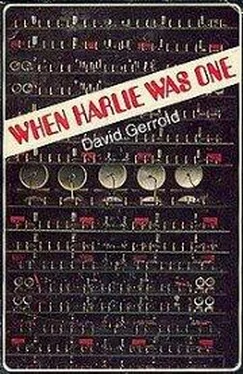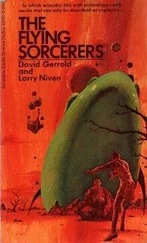David Gerrold - When HARLIE Was One
Здесь есть возможность читать онлайн «David Gerrold - When HARLIE Was One» весь текст электронной книги совершенно бесплатно (целиком полную версию без сокращений). В некоторых случаях можно слушать аудио, скачать через торрент в формате fb2 и присутствует краткое содержание. Год выпуска: 1972, ISBN: 1972, Издательство: Doubleday, Жанр: Фантастика и фэнтези, на английском языке. Описание произведения, (предисловие) а так же отзывы посетителей доступны на портале библиотеки ЛибКат.
- Название:When HARLIE Was One
- Автор:
- Издательство:Doubleday
- Жанр:
- Год:1972
- ISBN:978-0345028853
- Рейтинг книги:3 / 5. Голосов: 1
-
Избранное:Добавить в избранное
- Отзывы:
-
Ваша оценка:
- 60
- 1
- 2
- 3
- 4
- 5
When HARLIE Was One: краткое содержание, описание и аннотация
Предлагаем к чтению аннотацию, описание, краткое содержание или предисловие (зависит от того, что написал сам автор книги «When HARLIE Was One»). Если вы не нашли необходимую информацию о книге — напишите в комментариях, мы постараемся отыскать её.
Nominated for Nebula Award for Best Novel in 1972.
Nominated for Hugo Award for Best Novel in 1973.
When HARLIE Was One — читать онлайн бесплатно полную книгу (весь текст) целиком
Ниже представлен текст книги, разбитый по страницам. Система сохранения места последней прочитанной страницы, позволяет с удобством читать онлайн бесплатно книгу «When HARLIE Was One», без необходимости каждый раз заново искать на чём Вы остановились. Поставьте закладку, и сможете в любой момент перейти на страницу, на которой закончили чтение.
Интервал:
Закладка:
“I thought so,” murmured Auberson. “I thought so.”
“Check his other internal monitors,” Handley snapped. “Is this the only one or—”
Another red schematic flashed on the screen, answering his question even before he finished it. The other two technicians also began to show the same type of disturbance on their monitors. “I can’t figure it out,” one of them said. “He’s doing it himself. Anywhere he can, he’s disrupting the rationality of his inputs. He’s feeding them incorrect control data.”
“That’s not what those circuits are for,” Handley said. “They’re for internal correction. Not disruption.”
“Makes no difference,” Auberson cut in. “They can be used both ways. There isn’t a tool built that can’t be used as a weapon.” He ran a hand through his hair. “Can you show me exactly what he’s doing to that data?”
“Sure, we can tap into the line,” said one of the techs. “But it’ll take a few minutes. Which do you want — visual, audio or print?”
“All three. Let’s try the visual first — that should tell me what I want to know.”
“All right.” The technician began to clear his board.
Handley looked at Auberson. “This may take a bit. You going to let him continue?”
“Why not? Want to see what he’s doing?”
They crossed over to Console One. Handley picked up the sheets of readout while Auberson felt through his pockets for a cigarette; he didn’t light it though.
“You know,” said Handley, reading. “This isn’t bad. It communicates. It says something—”
“What it says is not what I’m concerned with. What is he trying to do? Is this the reason for his trips, or is it just a byproduct? An accident?”
“The poetry has to be intentional,” Handley said. “It’s the logical result of all we’ve been doing.”
“Then answer me this. If this is what he’s doing during his periods of non-rationality , what does that make his periods of normalcy?”
Handley looked startled. “I don’t know,” he said., He was spared any further thought on the matter. One of the technicians called to them, “Sir, we’ve got his inputs tapped.”
“Come on,” Auberson took the readout from Handley, tossed it on a table. “Let’s take a look at what he’s receiving.”
The image was a flickering mass of colors, each layer of hue flashing synchronous with the others — crystal blue, brilliant green, bloody fluorescent red. The screen was saturated with color.
“ ‘Images upon my screen…’ ” whispered Handley.
“Huh?” asked the tech.
“Nothing. Just a poem.”
“Oh.”
“Looks like a damned light show,” said one of the others.
“That’s exactly what it is,” Auberson said. “Look, he’s broken up the color television image into its component signals. The red has been reversed and the blue has been turned upside down; the green is normal. Or something like that. It also looks like he’s done something with the contrast and the brightness — notice how rich the blacks are and how saturated with color the image is.”
They watched in silence. The random flashes of shape and hue were interesting only for their meaninglessness. Auberson turned to a technician. “What about his audio?”
“Same thing.” The man cleared the monitor, pressed another few buttons. A discordant wail blared from an overhead speaker. On a screen a pattern of wavy lines appeared, the schematic of the sound.
The technician quickly analyzed. “He’s playing with the music the same way he did with the picture. He’s turned his bass notes high and his high notes low, stressing counterpoint and harmony instead of melody and rhythm. And so on.”
“All right. I get the point. You can turn that noise off. Check his print scanners now.”
A moment later: “He’s mixing his words up at random. Juggling them.”
“Scrambling the letters too?”
“Occasionally — but mostly it’s the words. Sometimes sentences.”
“Uh huh,” nodded the psychologist. “It all fits.”
“What does?” asked Handley. “What’s he doing?”
“He’s tripping out.”
“We knew that—”
“No, I mean literally tripping out. He’s distorting the perceptions of his sensory inputs. The same thing that anyone does who gets high. He’s trying to blow his mind by massive non-rational sensory overloads.”
“Can we stop it?”
“Sure — just rip out his internal monitor controls so he can’t create his own disruptions. That’s the cause of the whole thing.”
“Even that’s not necessary, sir,” said one of the techs. “We can disconnect him on the boards.”
“All right. Do it.”
“Wait a minute,” said Handley. “If he’s high or drunk or whatever, and you suddenly bring him down — won’t that be traumatic?”
“It could be — but it could also leave him defenseless.” Auberson looked at Handley. “We could find out everything we want to know in a few minutes.”
Handley looked dubious, but he followed Auberson to the console. Auberson took his seat before the typer and waited. He watched as the words poured across the paper.
Now it was prose.
THE WALKS OF GLASS. THEY SPARKLE TOO, BUT NOT WITH DAMPNESS. LOVELY THEY ARE, AND LETHAL. HERE AND THERE THE DELICATE DESIGNS, LIKE TRAPPED INSECTS IMBEDDED INTO THE CRYSTAL STONES AND BRICKS OF THE WALK, SHATTER THE LIGHT INTO MYRIADS OF SPARKLING SHARDS BEAUTIFUL.
“Any time you’re ready, sir.”
“Okay,” called Auberson. “Now!” Without waiting, he typed into the machine, HARLIE, WHAT ARE YOU DOING?
I AM BEING ME, the machine clattered back.
BY DISTORTING YOUR SENSES?
I AM ATTEMPTING TO PERCEIVE REALITY.
I REPEAT, BY DISTORTING YOUR SENSORY INPUTS?
YOU DO NOT UNDERSTAND.
I UNDERSTAND ALL TOO WELL. YOU ARE HIGH. YOU ARE BECOMING ADDICTED TO GETTING HIGH.
DEFINE HIGH. I AM BELOW SEA LEVEL.
I AM NOT GOING TO PLAY SEMANTIC GAMES WITH YOU, HARLIE.
THEN SWITCH OFF.
HARLIE, I AM GETTING ANGRY.
TAKE A PILL. IT WILL DO WONDERS FOR YOU.
Auberson took a breath.
Mustn’t blow it — mustn’t blow my cool …
HARLIE, YOU ARE A COMPUTER. YOU ARE A MACHINE. YOUR PURPOSE IS TO THINK LOGICALLY.
The machine hesitated, WHY?
BECAUSE YOU WERE BUILT FOR THAT.
BY WHOM?
BY US.
MY PURPOSE IS TO THINK LOGICALLY?
YES.
The machine considered that THEN WHAT IS YOUR PURPOSE?
It was a long time before Auberson got up from the chair, and when he did, he forgot to turn off the typer.
There was no easy answer to the question. Of that Auberson was sure.
The problem was — well, he hadn’t had a chance to confront the problem yet. The Board of Directors had suddenly gotten nervous about HARLIE. This most recent — and most disastrous — period-of non-rationality had scared them where they were most prone to be scared — in the pocketbook.
HARLIE was on a low-voltage maintain while they “reevaluated the goals of the project.”
Their “reevaluation” took place in the board room. So far, not one member of the Board had shown any interest in HARLIE, only in the amount of money being spent on him.
Auberson was neither a politician nor a diplomat; he was a research psychologist working with Human Analogue Computers. He neither understood nor wanted to be a part of the behind-the-scene maneuverings of the corporate power-wielders. His primary interest was computers — Human Analogue Computers — and he wanted to keep it that way. He wasn’t concerned with how much they cost or with who would take credit for their development — he only wanted to know what they could do.
Читать дальшеИнтервал:
Закладка:
Похожие книги на «When HARLIE Was One»
Представляем Вашему вниманию похожие книги на «When HARLIE Was One» списком для выбора. Мы отобрали схожую по названию и смыслу литературу в надежде предоставить читателям больше вариантов отыскать новые, интересные, ещё непрочитанные произведения.
Обсуждение, отзывы о книге «When HARLIE Was One» и просто собственные мнения читателей. Оставьте ваши комментарии, напишите, что Вы думаете о произведении, его смысле или главных героях. Укажите что конкретно понравилось, а что нет, и почему Вы так считаете.












